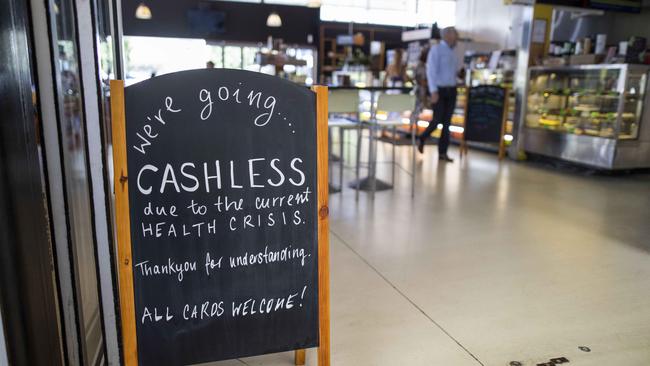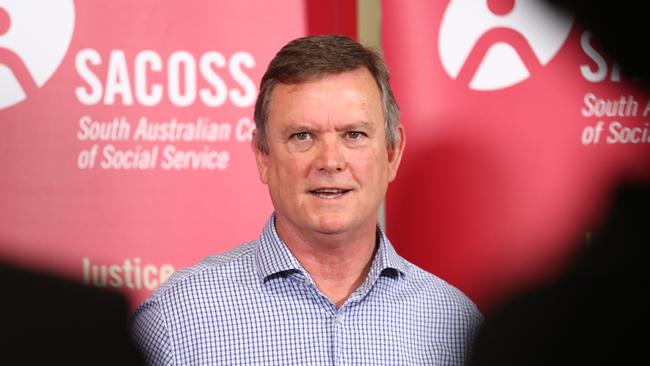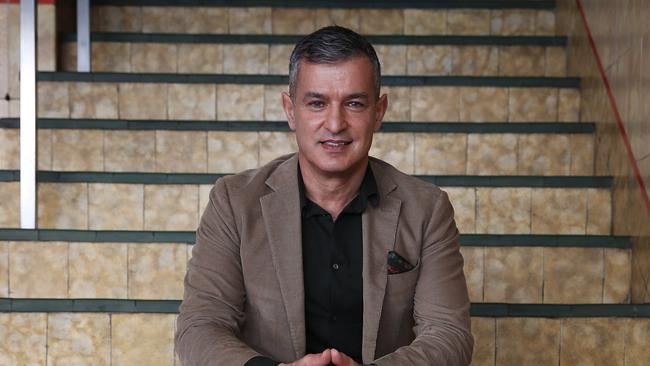Cashless economy, but is there a higher cost?
Cash is no longer king with more businesses and consumers opting for card-only or contactless payments, so what does the law say and will some pay a higher price?

Business
Don't miss out on the headlines from Business. Followed categories will be added to My News.
Consumers can vote with their feet if businesses don’t want to accept cash, but post-pandemic fears, macroeconomic changes and a rush for convenience are pushing more Australians to join the contactless queue, and some are simply being left behind.
Last week, the Reserve Bank released findings of separate surveys into consumer cash use and acceptance by retailers, conducted in late 2020.
Forty per cent of the 1070 people surveyed were using less cash since the start of the pandemic due to lockdowns and other restrictions, more online spending and concerns over transmission of the virus via banknotes.

Almost half of the respondents (45 per cent) had encountered a business that did not accept cash in the month of September 2020, a substantial increase from 23 per cent in 2019.
Almost a quarter of respondents cited concerns about cash acceptance as a reason for preferring not to use cash, compared with just 7 per cent in 2019.
At the business end, cash acceptance rate decreased by 3.6 percentage points to 95.8 per cent, compared with near-universal cash acceptance in February 2020.
Many public events, including the recent Fringe Festival, had cash-less venues.
The Reserve Bank noted that a small decline in cash acceptance by a few merchants could potentially lead to a larger decline in the ability for people to use cash.
“Ultimately it’s up to retailers and businesses to determine the methods of payment they accept and, while refusing to accept cash can be frustrating, it’s entirely understandable in the current climate,” Dini Soulio, South Australian Commissioner for Consumer Affairs, said.
“For those consumers who are unable to make cashless payments, we would encourage them to use those businesses they are familiar with that do accept cash or, alternatively, contact the business ahead of time to determine whether they accept cash payments,” Mr Soulio said.
In 2020, his team fielded 18 calls inquiring about refusal to accept cash, 12 of which were between March and June. There have been no calls this year.

The Currency Act 1956 (Cth) states that notes and coins remain legal tender, but this does not mean that they have to be used in a transaction, says Lisa Christo, senior associate from NDA Law.
“When a consumer buys an item from a business, they enter into a contract for the sale of those goods,” Ms Christo said.
“The business can set the payment terms of that contract before you purchase those goods, including the method of payment.
“If there is a sign that says the business does not accept cash or the cashier tells you, the business is able to refuse cash as payment.”
Cash payments have been declining with the rise of newer (and at times more convenient) technologies, she said.
“Credit cards, debit cards, payments using a smart phone, digital wallets and even using your Apple watch have increased our ability to ‘tap and pay’ rather than using cash.”
But not everyone is on board with the macroeconomic changes to society.
“People who are unable to use, or do not trust online banking, homeless people, or people who have squirrelled away money to flee a domestic violence situation, are all examples where the refusal to accept cash payments may be detrimental,” Ms Christo said.
“But this unfortunately does not affect the legal position that a business is able to refuse cash payments.”

It’s an issue that is further exacerbated by the “poverty premiums” imposed by some changes, according to the community services-focused South Australian Council of Social Service (SACOSS).
“Transparency about (transaction and linked account) fees and charges remain a concern and if you are using more recent forms of cashless payment processes like an app on a mobile phone, there are additional costs associated with the phone and data charges,” SACOSS chief executive Ross Womersley said.
“Whilst all these little extra charges might seem nominal to those of us on a decent level of income, they can actually accrue a significant poverty premium for those on low incomes,” Mr Womersley said.
“The move to cashless payments has been particularly problematic for people who may be begging on our streets for material help and indeed for many charities that rely on cash donations/fundraising.
“One of the most common issues raised is that people simply don’t have cash to give anymore!”
The Australian Retailers Association says retailers need to cater for all different payment options.
“We’ve seen a powerful and permanent shift in the way people do business as a result of Covid – with many retailers using the pandemic to transform their business models to better meet the needs of consumers,” chief executive Paul Zahra said.
“One of these trends is the shift away from cash, which was already occurring pre-Covid and has only accelerated through the pandemic,” Mr Zahra said.
“Retailers have embraced the shift towards a cashless society, offering contactless payments and embracing new payment methods like buy now, pay later.
“Having said that, cash transactions still have a role to play, and many older Australians and vulnerable groups are reliant on cash to pay for the things they need.
“It’s important that retailers can cater for all the different payment options so they can continue to serve their customers.”
Originally published as Cashless economy, but is there a higher cost?



